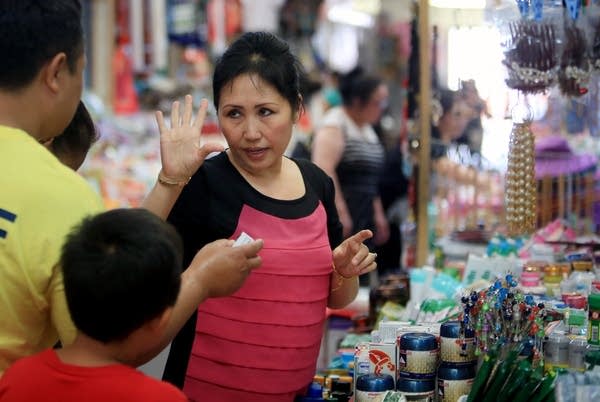Hmong vendors learn the law on legal drug sales

A few blocks from the state Capitol, shoppers at the Hmongtown Marketplace can buy just about anything.
The bustling center of small businesses is a favorite of the city's Hmong community because if offers fresh groceries, medicinal herbs, and prepared food.
But a June 2013 raid found that some vendors in the marketplace also had drugs for sale. Ramsey County Prosecutors charged 14 people with selling misbranded drugs, possessing and selling drugs that require a license, selling syringes, and unlawfully possessing poison.
"There's a communication gap, and an education gap in some of this."
The vendors say they didn't understand that what they were doing was wrong.
Create a More Connected Minnesota
MPR News is your trusted resource for the news you need. With your support, MPR News brings accessible, courageous journalism and authentic conversation to everyone - free of paywalls and barriers. Your gift makes a difference.
"All these medicines that we were selling, we've seen them since we were little kids and our parents gave us these medicines to eat," said Song Vang, a vendor who was charged with three misdemeanors. "Even though we live here now our minds are still thinking we're back in Thailand. We ate medicines that we knew from back then. Now we do not sell them."
Vang, who has been at the market for about five years, said she was only selling medicine that is commonly sold in her homeland. She is among a dozen vendors with stalls at the marketplace who have been participating in Emergency and Community Health Outreach -- a program to help them understand and follow state law.
The nonprofit organization, also known as ECHO, works with refugee and immigrant communities in Minnesota to create a safe community environment. It has created educational sessions and meetings for the vendors.

Today, Vang only sells cosmetics. When customers ask for medicine she points to a sign made by ECHO that indicates she is not a doctor and does not sell pharmaceuticals. She said she doesn't want to cause trouble for her business or the market.
The raid came as a shock to vendors and to Toua Xiong, who owns the Hmongtown Marketplace. He said the vendors did not intend to break the law but were only trying to make a living.
"They are hardworking people, honest people, and trying to work very hard to get a second type of income so that they can send their children to college," Xiong said.
Despite the raid, Xiong said the number of vendors at the market has been consistent. However two of the charged vendors are no longer doing business there and are not in the diversion program. The rest of those charged are participating.

Some Hmong vendors were very worried about what the charges could mean, said Lillian McDonald, executive director of ECHO.
"There was a lot of concern from their prospective about what happened, what went wrong, that they may be penalized for in the court of law which is scary," she said. "It could not only destroy their businesses but their families and also they didn't intend for that to happen. So there's a communication gap, and an education gap in some of this."
McDonald said a video produced in Hmong helps explain the products that vendors can legally sell at the market. The educational sessions also help address cultural misunderstandings for some vendors about what is considered a restricted drug in the United States.
The diversion program will give the vendors important information with a chance to clear their names, said Laura Pietan, St. Paul's deputy city attorney.
The 12 participants will meet with ECHO and other government agencies again during the fall of 2014. At that time the participants are expected to complete the program. If they do, the charges against them will be dismissed. If they do not complete the program the misdemeanor charges they face will be issued against them once again in court.
"They had to cooperate with ECHO Minnesota's creation and dissemination on the educational training," Pietan said. "Upon doing those things in a year's time, your criminal case will be dismissed. It's a great incentive to do something positive and then in exchange they city's gonna offer a dismissal of that case so you don't have a criminal record."
Read more stories from MPR News Young Reporters series


